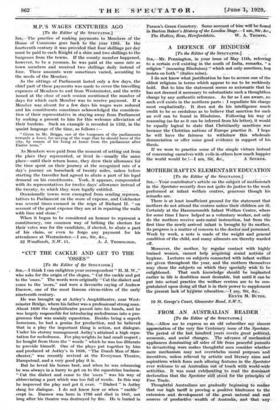• M.P.'S WAGES CENTURIES AGO [TO the Editor of the
'SliEcrAron.] ' Sm,—The practice of making payments tO Members of the Hinise -COnfinons goes baCk to' the year 1205. In the fourteenth century it was Provided that four shillings per day must be paid to each knight of a shire and two shillings to the burgesses from the towns. If the county member happened, however, to be a yeoman, he was paid at the same rate as town members and received two shillings daily instead of four. These amounts were sometimes varied; according to
the needs of the Member. '
As the sittings of Parliament lasted only a few days, the chief part_ of these payments was made to coyer the travelling expenses of Members to and from Westminster, and the writs issued at the close of each session mentioned the number of days for which each Member was to receive payment. If a Member was absent for a few_ days his wages were reduced and his constituents sometimes acknowledged the considera- tion of their .representative in staying away from Parliament by making a present to him for this welcome alleviation of their burdens. Such an example is recorded in 1532, in the
quaint language of the time, as follows _
". Given 49 Mr. Briggs, one of the burgesses of the parliaments towards a boast, for savyng of the wage that he should have of the City, by reason of his being at home from the parliament after Easter term."
As Members were paid from the moment of setting out from the place they 'represented, or "Wed in—usually the same place—until their return home, they drew their '6110wande.fiii: the time spent_ on their journey at the recognized rate of a day's journey • on horseback of twenty- miles, unless before starting the traveller had agreed to abate a part of his legal demand on his constituents. • York, it appears, compounded With its representatives for tivelie days' allowance instead of the twenty, to which they_ were legally entitled. ; Occasionally towns were exempted from sending represm tatives to Parliament on the score of eZpense, and _Colchester was several times excused in the reign of Richard II. "On account of the great expense they are at in repairing the walls with lime and stone." • When it began to be considered an honour to represent -a constituency, one common way of . bribing the electors for their votes was for the candidate, if elected, to abate a part of his- claim, or even to forgo any payment for his attendance at Westminster.—I am, Sir, 4tc., • -










































 Previous page
Previous page